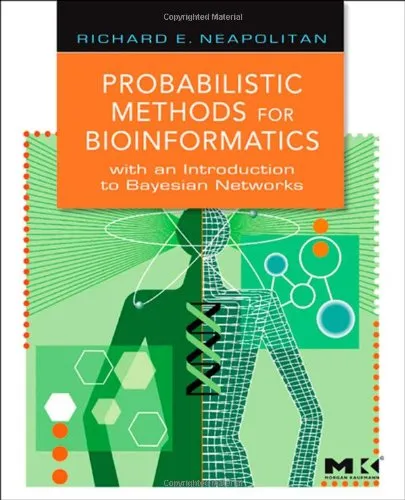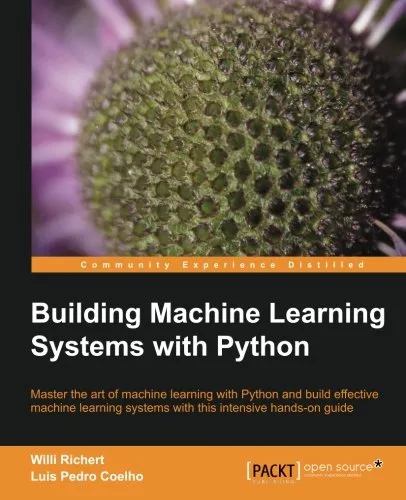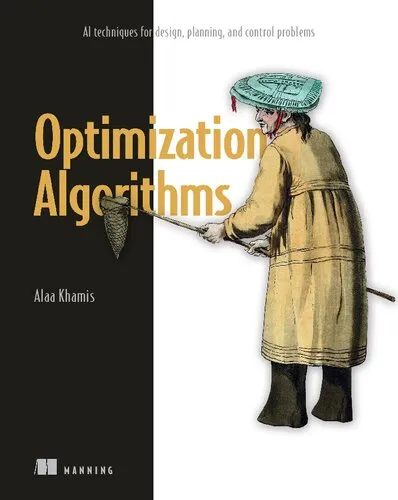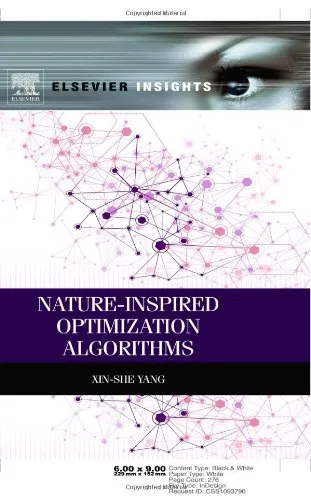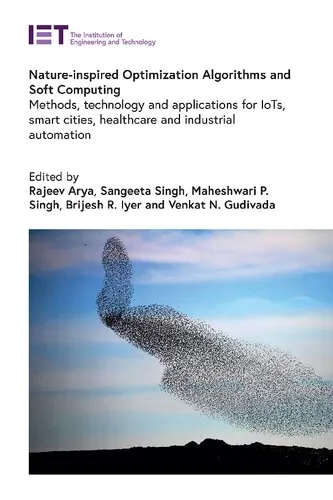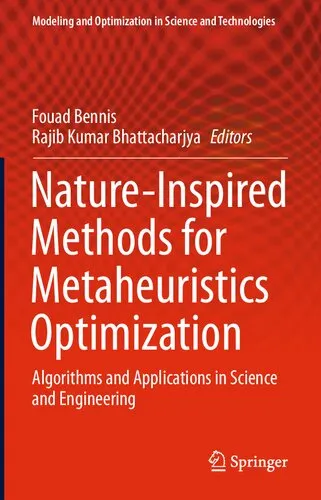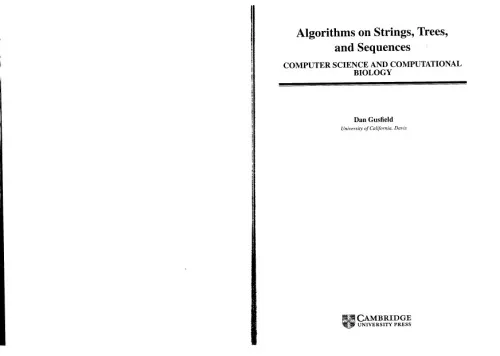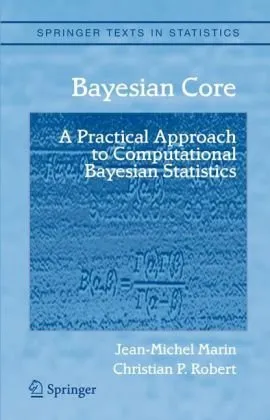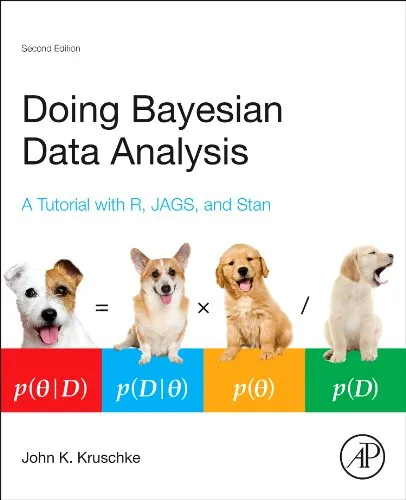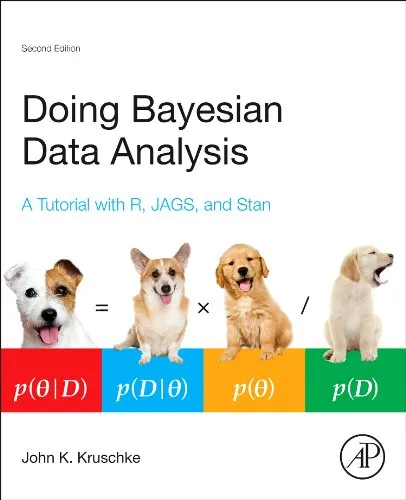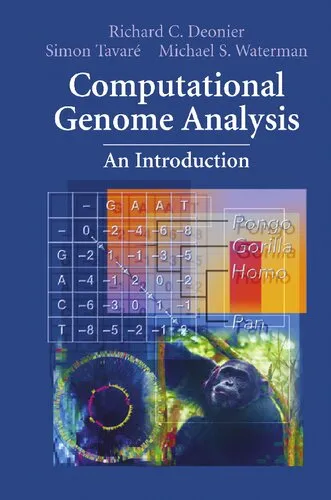Probabilistic Methods for Bioinformatics: with an Introduction to Bayesian Networks
4.5
بر اساس نظر کاربران

شما میتونید سوالاتتون در باره کتاب رو از هوش مصنوعیش بعد از ورود بپرسید
هر دانلود یا پرسش از هوش مصنوعی 2 امتیاز لازم دارد، برای بدست آوردن امتیاز رایگان، به صفحه ی راهنمای امتیازات سر بزنید و یک سری کار ارزشمند انجام بدینکتاب های مرتبط:
معرفی کتاب
کتاب Probabilistic Methods for Bioinformatics: with an Introduction to Bayesian Networks یک منبع پیشرفته و قابلاعتماد برای درک کاربرد روشهای احتمالاتی در بیوانفورماتیک است. این کتاب توسط من، ریچارد ای. نئاپولیتان، نوشته شده است و به شکلی اصولی و کاربردی به معرفی و آموزش مفاهیم پایهای و پیشرفته Bayesian Networks و روشهای احتمالاتی در حل مسائل پیچیده بیولوژی میپردازد.
خلاصهای جامع از کتاب
هدف اصلی این کتاب ارائه دانش و مهارتهای لازم برای استفاده از روشهای احتمالاتی در تحلیل دادههای بیوانفورماتیک است. در دنیای امروز که دادههای بیولوژیکی رشد چشمگیری داشتهاند، نیاز به ابزارهایی که بتوانند این دادهها را تحلیل، مدلسازی و تفسیر کنند، بیش از پیش احساس میشود. کتاب با تمرکز بر Bayesian Networks به عنوان یکی از ابزارهای اصلی مدلسازی به دانشجویان و محققین نشان میدهد چگونه میتوان مسائل بیولوژیکی را از دریچهای منظم و دقیق بررسی کرد.
کتاب ابتدا با اصول اولیه تئوری احتمال و مفاهیم مرتبط آغاز میشود و سپس به ساختارها و الگوریتمهای Bayesian Networks میپردازد. نمونهکارهای واقعی، کاربرد این مفاهیم در زمینههایی مانند تحلیل دادههای ژنتیکی، تعیین ساختار پروتئین، پیشبینی سیستمهای زیستی و غیره را بر اساس روشهای احتمالاتی نمایش میدهد. در هر فصل تلاش شدهاست تا با مثالهای علمی و چالشبرانگیز، درک عملی مخاطبان تقویت شود.
نکات کلیدی کتاب
- ارائه دانش جامع در مورد استفاده از Bayesian Networks در مدلسازی مسائل پیچیده بیولوژیکی.
- پیوند روشهای احتمالاتی کلاسیک با چالشهای روز بیوانفورماتیک.
- تمرکز بر ابزارها و الگوریتمهای کاربردی در پیشبینی و تفسیر دادههای زیستی.
- آموزش گام به گام مفاهیم پایه، همراه با مثالهای عملی و مسائل واقعی.
- پوشش گسترده موضوعاتی مانند clustering، inference، و sequence alignment با استفاده از روشهای احتمالاتی.
نقلقولهای مشهور از کتاب
“Statistical models, and specifically Bayesian Networks, are among the most powerful tools for understanding the complex relationships inherent in biological systems.”
“To transform the vast data into meaningful knowledge in bioinformatics, probabilistic reasoning is not merely a tool, but an essential framework.”
چرا این کتاب اهمیت دارد؟
علم بیوانفورماتیک نقش کلیدی در تحقیقات زیستی و پزشکی ایفا میکند. از طراحی داروهای جدید تا فهم بهتر از ساختارها و توابع ژنتیکی، روشهای پیشرفته این علم در حال تحول هستند. در این میان، Bayesian Networks و مدلهای احتمالاتی به دلیل توانایی تجزیه و تحلیل دادههای بزرگ و پیچیده، از اهمیت ویژهای برخوردارند. این کتاب نه تنها برای دانشجویان و محققین بیوانفورماتیک، بلکه برای هر کسی که به دنبال درک بهتر از این مدلها و ابزارهاست، ضروری است.
با خواندن این کتاب، میتوانید درک عمیقی از چگونگی کاربرد نظریه احتمال در بیوانفورماتیک پیدا کنید و توانایی خود را برای تجزیهوتحلیل اطلاعات، پیشبینی روندهای زیستی، و کشف الگوهای پنهان در دادههای بزرگ افزایش دهید.
Introduction
"Probabilistic Methods for Bioinformatics: with an Introduction to Bayesian Networks" by Richard E. Neapolitan is a groundbreaking book that merges two transformative fields: probability theory and computational biology. This text serves as an invaluable resource for researchers, students, and professionals seeking a comprehensive understanding of the fundamental probabilistic methods used in bioinformatics, with a special emphasis on Bayesian networks.
Bioinformatics is inherently complex due to the vast array of biological data and the uncertainty associated with it. This book bridges the gap between biology and computational science by teaching readers how to harness probabilistic reasoning for analyzing biological systems. Whether you're pursuing cutting-edge research in genomics, systems biology, or computational medicine, this book equips you with the technical knowledge and statistical tools to tackle real-world challenges.
Detailed Summary
This book begins with a foundational introduction to probability theory and Bayesian networks, making it accessible to readers with little or no prior exposure to these topics. The author skillfully explains complex concepts with clarity and precision, ensuring that readers can grasp the material regardless of their background.
Key topics include understanding probability distributions, Markov processes, and Bayesian inference. The book also explores bioinformatics applications such as sequence alignment, phylogenetics, gene expression analysis, and protein structure prediction. For each topic, the author demonstrates how probabilistic models can address uncertainty and provide meaningful insights.
A unique feature of this text is its focus on Bayesian networks. Readers will learn how to construct, interpret, and apply these models to bioinformatics problems – a skill that is increasingly relevant given the growing emphasis on data-driven research. The chapters are enriched with case studies, mathematical proofs, and exercises to reinforce learning and encourage active participation.
Key Takeaways
- An in-depth understanding of key probabilistic methods, including Bayesian statistics and Markov models, as they apply to bioinformatics.
- A strong foundation in Bayesian networks, including their construction, inference, and application to biological data.
- Practical examples and exercises illustrating the use of probabilistic methods in analyzing large-scale genomic and proteomic data.
- A thorough exploration of the challenges associated with handling uncertainty in biological systems and how probabilistic reasoning provides solutions.
- Clear mathematical explanations paired with biological relevance, making the content accessible yet rigorous.
Famous Quotes from the Book
“In the face of biological uncertainty, probability theory is not just a mathematical convenience—it is a necessity.”
"Bayesian networks give us the ability to represent complex dependency structures in biological systems, guiding us from data to discovery."
“Bioinformatics is not only about collecting data, but about translating data into knowledge—and for that, probabilistic reasoning is essential.”
Why This Book Matters
As biology transitions into an era of big data, the ability to process, interpret, and make predictions using incomplete or uncertain information is more essential than ever. This book stands out because it equips readers with the tools to handle the intrinsic uncertainty of biological data. By blending probability theory, computational algorithms, and biological concepts, it prepares readers to tackle pressing challenges in genomics, transcriptomics, and beyond.
Unlike many technical texts, "Probabilistic Methods for Bioinformatics" balances theoretical rigor with practical applicability. The book doesn’t simply delve into abstract mathematics. Instead, it contextualizes each concept within the broader realm of biology, ensuring that readers understand the "why," not just the "how."
Moreover, this book is a stepping stone for those interested in advancing interdisciplinary fields. For computational biologists, statisticians, or bioinformaticians, it serves as a critical reference work, providing intellectual tools to progress their careers and make impactful discoveries in biological science.
In summary, Richard E. Neapolitan's "Probabilistic Methods for Bioinformatics" is more than just a book—it is a gateway to understanding, exploring, and innovating at the intersection of probability theory and computational biology. Its blend of mathematical depth and biological relevance makes it a must-read for anyone seeking to thrive in the rapidly evolving field of bioinformatics.
دانلود رایگان مستقیم
شما میتونید سوالاتتون در باره کتاب رو از هوش مصنوعیش بعد از ورود بپرسید
دسترسی به کتابها از طریق پلتفرمهای قانونی و کتابخانههای عمومی نه تنها از حقوق نویسندگان و ناشران حمایت میکند، بلکه به پایداری فرهنگ کتابخوانی نیز کمک میرساند. پیش از دانلود، لحظهای به بررسی این گزینهها فکر کنید.
این کتاب رو در پلتفرم های دیگه ببینید
WorldCat به شما کمک میکنه تا کتاب ها رو در کتابخانه های سراسر دنیا پیدا کنید
امتیازها، نظرات تخصصی و صحبت ها درباره کتاب را در Goodreads ببینید
کتابهای کمیاب یا دست دوم را در AbeBooks پیدا کنید و بخرید
1483
بازدید4.5
امتیاز0
نظر98%
رضایتنظرات:
4.5
بر اساس 0 نظر کاربران
Questions & Answers
Ask questions about this book or help others by answering
No questions yet. Be the first to ask!
